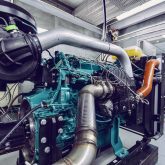On the eve of Britain’s June 23 vote, I was in Hungary eating supper with a group of journalists including a freelancer who is also part of a family farm operation in England. She was the one to correctly predict the “leave” victory.
That farmers would vote to leave the EU was astonishing to me. All farmers in the EU enjoy some pretty significant subsidy financing direct from Brussels, and her farm does too. Her family’s sheep raising operation isn’t particularly large by U.K. standards, but even they pocket annual subsidies worth nearly C$70,000.
Read Also

Riding the tariff rollercoaster
Farmers are accustomed to roller-coaster years. But the current geopolitical windstorm is something else entirely. On his cattle operation near…
The general consensus — or possibly faint hope — among U.K. farmers seemed to be that subsidies would continue if Britain left the EU, according to that journalist and various media interviews I saw. Future payments were expected to come directly from the country’s own government. But realistically, will the British government have the revenues to continue such generous payments?
In fact, farmers had already started pulling back. Machinery company executives told me British farmers had been keeping their wallets closed as the voting day neared, and farm equipment sales in that country had ground to a virtual snail’s pace. In other words, Brexit uncertainty was already causing pain well beyond Britain’s borders, as machinery orders at factories in other countries slowed.
The pending referendum was just one of a number of factors holding back equipment sales in Europe. An April survey conducted by Agrievolution, an industry association representing global farm equipment manufacturers, revealed many executives at equipment brands in Western Europe had a pretty pessimistic view of future sales volumes. Overall, 43 per cent said they expected sales numbers to decline in the next six months.
U.S. manufacturers weren’t seeing a future any brighter either. The survey reported 58 per cent rated their current business climate as “unfavourable,” and they were taking that pessimism to heart, with 77 per cent reporting that they were planning staff reductions.
With all that fatalism, the last thing the industry needed was the compounding factor of a Brexit.
Plus, the Big Three farm equipment manufacturers also shared in the stock market loss that followed the vote. Their stocks all declined, but AGCO suffered the most, losing US$10 per share and taking the longest to recover.
Yet that could also be what was behind a very unusual ag machinery product launch this summer.
AGCO’s president and CEO, Martin Richenhagen, appeared on CNBC’s “Mad Money” TV show in early July to introduce the new Challenger tractors soon to be released into the North American market. They were being introduced not to farmers, but to stock market investors.
That had all the earmarks of a strategy designed to help AGCO stocks climb back out of the Brexit-induced doldrums.
“This is the pre-launch,” Richenhagen told the show’s host. “My guys don’t like it so much.”
The tractors were originally set to be unveiled to producers at the U.S. Farm Progress Show in late August, and the CNBC appearance was unexpected. Richenhagen’s comments suggest his brand marketing managers have felt the thunder fizzle out of their industry introduction plans after his TV appearance.
On the show, Richenhagen spoke optimistically about the global equipment market, as if to sooth any investor fears.
“I think we are close to bottoming out,” he said of industry sales numbers. “Hopefully, bottoming out this year. And I’m slightly more optimistic for 2017. We’ll perform pretty well this year and, I think, deliver what we promised.”
He also addressed the impact a Brexit will have on the equipment industry, explaining AGCO long ago pulled manufacturing operations out of Britain.
“Brexit is a no-brainer for us,” he said, distancing AGCO from any manufacturing-related problems. “Europe is not doing so well, but we had that in our plans; therefore, for us it’s not a surprise. There are certain areas of Europe doing better. We don’t manufacture in England, because when they decided not to be a Euro country we had to move out. Because exporting from England with a very high pound was not feasible.”
A post-Brexit survey of corporations within the U.K., reported by the BBC, claims many other companies are now reconsidering their decision to operate in that country. Without the assurance of access to the continental marketplace that Richenhagen mentioned, future corporate investment in the U.K. could fall drastically.
What’s worse, the “out” result may threaten the U.K.’s very stability. It is already highlighted deep divisions within the population.
Unlike older Baby Boomers, roughly 75 per cent of voters under 25 years of age were in favour of remaining within the EU. Many young Europeans have been taking advantage of the freedom to move to other countries to study or work, a benefit that could come to an abrupt end if the UK officially invokes article 50 of the EU membership agreement and begins the withdrawal procedure.
Scotland, which had barely survived a separation referendum a couple of years ago, voted overwhelmingly in favour of remaining within the EU. Now the “out” vote has prompted renewed separatist sentiment and the spectre of yet another referendum. Northern Ireland, too, voted strongly in favour of remaining in the EU. And that’s a region that doesn’t need another excuse to dislike England.
Other European countries, notably Sweden and France, also have growing hyper-nationalist political movements within them that have been calling for a withdrawal of their nations from the EU. The Brexit vote may give them added momentum.
What’s perhaps most disturbing about the Brexit is many observers have claimed some of the politicians behind the vote itself and the “out” campaign didn’t intend to actually trigger a withdrawal from the EU.
Instead, they were simply attempting to position themselves as strong nationalist leaders for personal political gain, expecting a vote result maintaining the status quo.
If that’s true, it appears to be no coincidence, then, that there has been a round of political resignations following the vote that has practically wiped political leadership clean in England.
Speaking at a media event in June just before the vote, Bernard Krone, president of Germany-based Krone, a forage equipment manufacturer, acknowledged that the global machinery market has slowed again this year.
“The agricultural machinery industry is going through tough times at the moment,” he said. “But, ladies and gentlemen, this was the case before. The market will recover… Because after every crisis, business starts to pick up again.”
The question now is when is that likely to happen.
Uncertainty caused by the Brexit vote will continue to affect ag equipment manufacturers, global investors, and U.K. farmers for some time to come.
















